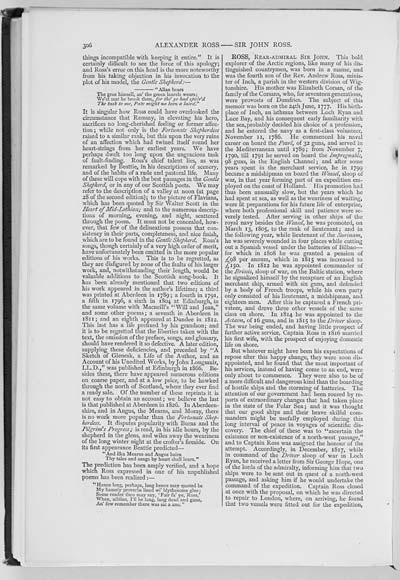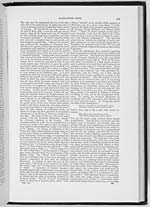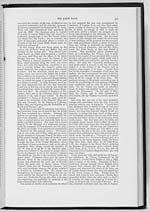306
things incompatible with keeping it entire." It is
certainly difficult to see the force of this apology;
and Ross's error on this head is the more noteworthy
from his taking objection in his invocation to the
plot of his model, the Gentle Shepherd:�
-----------"Allan bears
The gree himsell, an' the green laurels wears;
We'el mat he brook them. for tho' ye had spair'd
The task to me, Pate might na been a laird"
It is singular how Ross could have overlooked the
circumstance that Ramsay, in elevating his hero,
sacrifices no long-cherished feeling or former affec-
tion; while not only is the Fortunate Shepherdess
raised to a similar rank, but this upon the very ruins
of an affection which had twined itself round her
heart-strings from her earliest years. We have
perhaps dwelt too long upon the ungracious task
of fault-finding. Ross's chief talent lies, as was
remarked by Beattie, in his descriptions of scenery,
and of the habits of a rude and pastoral life. Many
of these will cope with the best passages in the Gentle
Shepherd, or in any of our Scottish poets. We may
refer to the description of a valley at noon (at page
28 of the second edition); to the picture of Flaviana,
which has been quoted by Sir Walter Scott in the
Heart of Mid-Lothian; and to the numerous descrip-
tions of morning, evening, and night, scattered
through the poem. It must not be concealed, how-
ever, that few of the delineations possess that con-
sistency in their parts, completeness, and nice finish,
which are to be found in the Gentle Shepherd. Ross's
songs, though certainly of a very high order of merit,
have unfortunately been omitted in the more popular
editions of his works. This is to be regretted, as
they are disfigured by none of the faults of his larger
work, and, notwithstanding their length, would be
valuable additions to the Scottish song-book. It
has been already mentioned that two editions of
his work appeared in the author's lifetime; a third
was printed at Aberdeen in 1789; a fourth in 1791,
a fifth in 1796, a sixth in 1804 at Edinburgh, in
the same volume with Macneill's "Will and Jean,"
and some other poems; a seventh in Aberdeen in
1811; and an eighth appeared at Dundee in 1812.
This last has a life prefixed by his grandson; and
it is to be regretted that the liberties taken with the
text, the omission of the preface, songs, and glossary,
should have rendered it so defective. A later edition,
supplying these deficiencies, and preceded by "A
Sketch of Glenesk, a Life of the Author, and an
Account of his Unedited Works, by John Longmuir,
LL.D.," was published at Edinburgh in 1866. Be-
sides these, there have appeared numerous editions
on coarse paper, and at a low price, to be hawked
through the north of Scotland, where they ever find
a ready sale. Of the number of these reprints it is
not easy to obtain an account; we believe the last
is that published at Aberdeen in 1826. In Aberdeen-
shire, and in Angus, the Mearns, and Moray, there
is no work more popular than the Fortunate Shep-
herdess. It disputes popularity with Burns and the
Pilgrim's Progress; is read, in his idle hours, by the
shepherd in the glens, and wiles away the weariness
of the long winter night at the crofter's fireside. On
its first appearance Beattie predicted�
"And ilka Mearns and Angus bairn
Thy tales and sangs by heart shall learn."
The prediction has been amply verified, and a hope
which Ross expressed in one of his unpublished
poems has been realized:�
"Hence lang, perhaps, lang hence may quoted be
My hamely proverbs lined wi' blythesome glee;
Some reader then may say, ' Fair fa' ye, Ross,'
When, aiblins, I'll be lang, lang dead and gane,
An' few remember there was sic a ane."
ROSS, REAR-ADMIRAL SIR JOHN. This bold
explorer of the Arctic regions, like many of his dis-
tinguished countrymen, was born in a manse, and
was the fourth son of the Rev. Andrew Ross, minis-
ter of Inch, a parish in the western division of Wig-
tonshire. His mother was Elizabeth Corsan, of the
family of the Corsans, who, for seventeen generations,
were provosts of Dumfries. The subject of this
memoir was born on the 24th June, 1777. His birth-
place of Inch, an isthmus between Loch Ryan and
Luce Bay, and his consequent early familiarity with
the sea, probably decided his choice of a profession,
and he entered the navy as a first-class volunteer,
November II, 1786. He commenced his naval
career on board the Pearl, of 32 guns, and served in
the Mediterranean until 1789; from November 7,
1790, till 1791 he served on board the Impregnable,
98 guns, in the English Channel; and after some
years spent in the merchant service, he in 1799
became a midshipman on board the Weasel, sloop of
war, in that year forming part of an expedition em-
ployed on the coast of Holland. His promotion had
thus been unusually slow, but the years which he
had spent at sea, as well as the weariness of waiting,
were fit preparations for his future life of enterprise,
where both professional skill and patience were se-
verely tested. After serving in other ships of the
royal navy besides the Weasel, he was promoted, on
March 13, 1805, to the rank of lieutenant; and in
the following year, while lieutenant of the Surinam,
he was severely wounded in four places while cutting
out a Spanish vessel under the batteries of Bilbao�
for which in 1808 he was granted a pension of
�98 per annum, which in 1815 was increased to
�150. In 1812 he was appointed commander of
the Briseis, sloop of war, on the Baltic station, where
he signalized himself by the recapture of an English
merchant ship, armed with six guns, and defended
by a body of French troops, while his own party
only consisted of his lieutenant, a midshipman, and
eighteen men. After this he captured a French pri-
vateer, and drove three other vessels of the same
class on shore. In 1814 he was appointed to the
Act�on, of 16 guns, and in 1815 to the Driver sloop.
The war being ended, and having little prospect of
further active service, Captain Ross in 1816 married
his first wife, with the prospect of enjoying domestic
life on shore.
But whatever might have been his expectations of
repose after this happy change, they were soon dis-
appointed, and he found that the most important of
his services, instead of having come to an end, were
only about to commence. They were also to be of
a more difficult and dangerous kind than the boarding
of hostile ships and the storming of batteries. The
attention of our government had been roused by re-
ports of extraordinary changes that had taken place
in the state of the Polar Sea; and it was thought
that our good ships and their brave skilful com-
manders might be usefully employed during this
long interval of peace in voyages of scientific dis-
covery. The chief of these was to "ascertain the
existence or non-existence of a north-west passage,"
and to Captain Ross was assigned the honour of the
attempt. Accordingly, in December, 1817, while
in command of the Driver sloop of war in Loch
Ryan, he received a letter from Sir George Hope, one
of the lords of the admiralty, informing him that two
ships were to be sent out in quest of a north-west
passage, and asking him if he would undertake the
command of the expedition. Captain Ross closed
at once with the proposal, on which he was directed
to repair to London, where, on arriving, he found
that two vessels were fitted out for the expedition,

![]() Universal Viewer |
Universal Viewer | ![]() Mirador |
Large image | Transcription
Mirador |
Large image | Transcription
![]()

